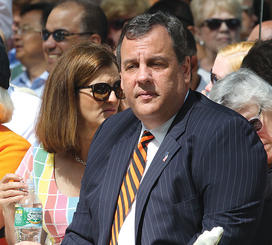Celebration, Solemnity
For the Class of 2016, a serious send-off at Baccalaureate, Commencement
From President Eisgruber ’83’s remarks on polarization in the United States to the poignant valedictory oration by Cameron Platt ’16, Princeton’s Commencement activities May 29–31 injected traditional celebrations with reminders of the debates over racism, free speech, and historical legacy that challenged the campus during the last two years.
That theme also played out at Baccalaureate and even in the talk by author Jodi Picoult ’87 at Class Day, where humorous speeches by class members typically have a starring role.
At Princeton’s 269th Commencement, Platt, a Rhodes scholar, told classmates about her grandfather, who left the family because he was gay and who died of AIDS in 1986. His reason for leaving was a family secret that she learned only as a Princeton sophomore. Her grandfather’s story had been “smothered,” she said, just as the stories of other marginalized people often are.
“For today, I’m less interested in the freedom of speech than I am in what we decide to do with that freedom, once we feel that we have it,” she continued. “Any conversation about free speech must acknowledge the relentless pressures that keep suppressed the voices of those already disenfranchised. When it comes to free speech, we do not start with a level playing field.”
Driving her remarks, and those delivered by Eisgruber a few minutes later, was the turmoil both in national politics and — closer to home — protests by members of the Black Justice League, which staged a sit-in in Eisgruber’s office last fall. That prompted a continuing discussion of the legacy of racism at Princeton, particularly the legacy of Woodrow Wilson 1879, and the campus environment for minority and low-income students.
Platt applauded students who spoke out during the protests. They showed her “the most urgent purpose of speech: to make audible the inaudible, to hold up the hurts that history has left unheard,” she said.
Eisgruber began by noting the “shockingly coarse” presidential campaign and the polarized public. He went on to address Princeton’s recent reckoning with Wilson’s legacy and with the University’s exclusionary past, noting that some critics have said these discussions are a distraction from Princeton’s work.
“But to decide collectively, indeed, as a community, about our future, we need to understand one another. We need to be able to see other people’s points of view, and we must forge shared spaces for disagreement and deliberation,” he said. “And understanding one another requires ... finding new ways to comprehend the history that has affected, and continues to affect, different groups and individuals in different ways.”
Speaking at Baccalaureate, Harvard law school professor Randall Kennedy ’77 made the intent of his speech clear: to “nudge [members of ’16] to become ambassadors for higher education” at a time when support for universities — and especially financial support for public universities — is declining. He rejected accusations that colleges are so “afflicted by political correctness” that unpopular opinions are repressed, saying that while there may be instances of ideological suppression, they are outliers. “Nowhere in America will one find environments more open to disputation than campuses like this one,” the home to professors and student organizations of all political and intellectual stripes. Nor is Princeton “a den of racist iniquity or sexist degradation or class oppression,” Kennedy said.

The six honorary-degree recipients included a former Federal Reserve chairman, a famous historian, and a fearless Chinese journalist (see page 15). But the longest ovation went to retired surgeon Robert Rivers Jr. ’53, one of Princeton’s first African American students and the first black member of the Board of Trustees. Rivers’ family had a long involvement with Princeton: His grandfather planted the elms that line Washington Road; his father was a University janitor; his mother cared for the children of a professor. Rivers “paved the way toward a university increasingly committed to diversity and inclusion, and he did it with dignity, grace, integrity, and a lifelong devotion to this university’s highest values,” University orator Robert Murley ’72 said, reading the citation.












No responses yet